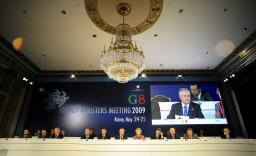A meeting of energy ministers and senior officials in Rome concluded with an action plan aimed at tackling key sector issues, Italian Economic Development Minister Claudio Scajola said on Monday.
Speaking after the meeting, hosted by Italy as Group of Eight president, Scajola said that ''important decisions'' had been made during the two days of talks.
He said representatives had continued negotiating throughout the night until Monday morning, and ''agreement was reached among all participating countries''.
The minister declined to discuss the plan in any detail but said it focused on three key areas: the fight against climate change, reviving an alliance between government and business, and the fight against energy poverty.
During the meeting delegates spotlighted the need to stabilize oil prices and provide security for investments, in order to fuel a global economic recovery.
Scajola said a ''common framework and shared rules and regulations'' were needed and called for greater cooperation between national governments and multilateral bodies.
The CEO of Italian energy giant ENI, Paolo Scaroni, also underscored the dangers of yo-yoing oil prices, which he said were creating instability in all energy sectors.
Echoing Scajola's call for greater cooperation, he suggested setting up a ''global energy agency'', as part of a two-point proposal aimed at stabilizing prices.
The second element of his plan focused on the need to ''identify mechanisms able to contain oil price instability and mitigate boom and bust cycles''.
Scaroni said his proposal, which set out three possible mechanisms for achieving this aim, was a more detailed version of an idea put forward three months ago at an OPEC meeting in Vienna, which he said had met ''with considerable interest''.
ENVIRONMENTALISTS CRITICIZE NARROW FOCUS OF MEETING.
But environmentalists criticized delegates for their narrow focus on oil prices and for failing to expand the scope of the talks to alternative energy sources.
''It would have been productive to make real use of this opportunity to work towards the construction of an alternative energy system based on low carbon dioxide emissions,'' said Vittorio Cogliati Dezza, President of Italy's largest green group Legambiente.
''It is clear that we cannot survive on oil alone, and stable oil prices, which have been the central issue at this G8 meeting, are not the solution to the current financial crisis or to global warming''.
Cogliati Dezza also criticized the final document produced by the meeting, which he said left one in doubt about what might be achieved at this July's summit of G8 leaders.
Both Legambiente and demonstrators from the international conservation organization Greenpeace were fiercely critical of Italy's decision to reintroduce nuclear power as an alternative to fossil fuels.
''Apart from the serious dangers involved, the cost of building these nuclear centres will use up all resources,'' said the Legambiente chief. ''Financing nuclear power along with incentives for clean sources is like trying to have your cake and eat it''.
Greenpeace also complained about the lack of any debate on solar power at the meeting.
A report published by the group on Monday highlighted the potential of concentrated photovoltaics, a comparatively new development in the solar sector, which they said offered a real solution to the energy problem, providing jobs for 90,000 people and cutting carbon dioxide emissions by 2.1 billion tonnes annually.
Also present at Monday's conference was International Monetary Fund First Deputy Managing Director John Lipsky, who warned that problems in the energy market looked set to continue into 2010.
He said predictions of a sluggish global recovery meant investments were likely to slow further in 2010.
However, he added that the recent rise in oil prices of recent weeks ''reflects a general upturn in confidence, based on signs that the worst period of global economic decline has finished''.
US Energy Secretary Steven Chu said his country had to change its energy consumption patterns, focusing on greater efficiency and energy savings.
He said national habits had developed at a time when the US was a net oil exporter but it now had to form new patterns in the context of ''sustainable and long-term development''.
The meeting, one of several policy summits in Italy's G8 programme, is being attended by energy ministers and officials from 23 countries, including the world's eight most industrialized nations, emerging economies and oil exporting nations.
The action plan agreed on at the meeting will be put before leaders at an upcoming summit of G8 leaders, taking place in L'Aquila in July.









